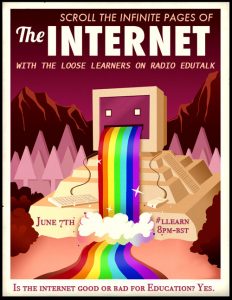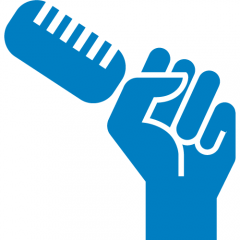Download Link: Loose Learners Episode 4
 Mariana Funes & John Johnston continue their discussion and exploration of the use of twitter by educators.
Mariana Funes & John Johnston continue their discussion and exploration of the use of twitter by educators.
On this episode we continue talking about social media and exploring what it means to ‘brag’ online and if those reading our posts can read our intention when posting. It is complicated – when is it not complicated with the internet of ours?
When posting we ourselves may not be fully aware of our intent. We may have mixed objectives – I want to share, not brag, but I am a little proud of this and hence I want to post it for all to see with a dash of bragging.
As we explore on this episode there has been many a word written on this topic and the whole issue of what it means to brag is evolving with our etiquette online.
Before we continue here we want say thanks to David Hughes for calling us ‘riveting’ last month:
“Riveting conversation on the balance between communication, twitter, boasting, interaction & identity. Go on John: retweet this!”
We felt a little proud to be called ‘riveting’ – but did we brag, humble brag or underbrag? Listen and find out.
Ian Guest was kind enough not only to listen but also to write a post on the first part of this conversation and he added new dimensions to consider as we make choices to communicate on Twitter, in particular.
He raised the relevance of the offline-online dimension amongst other things, we not only have to consider how our message is received by online peeps but also what about those offline who may or may not be social media savvy? Ian tells us,
“It was agreed in the podcast that one of the activities less likely to cause offence is when teachers use social media to ‘share’ the activity that’s taking place in the classroom. This is often an accessible means through which to keep parents informed of what their young ones have been learning, or sometimes to celebrate achievements. I wonder though whether this is always the neutral act that it might appear to be on the surface? Some teachers may be more savvy with social media, so what impression will be created if certain teachers in the school share more regularly than others? I wonder too about those teachers who share their classroom activity, ostensibly to let parents and other teachers know what is going on in their classrooms, but perhaps with a subtext which says ‘look how good I am.’ This perhaps speaks to what John was saying about the reticence of some teachers to participate in this kind of activity for fear of being seen as a ‘show off.’ A fine line after all?”
We liked Ian’s idea of a ‘fine line’ and we explore some of the ambiguities at play on this episode. How I intend my message and how it is received by different people may or may not be the same thing. As much I a may not be aware of my unconscious intentions when posting, readers bring their own baggage to what they read and how they interpret it. It’s complicated.
A recent study about Facebook tells us that:
“ We found that source and focus played distinct roles in impression formation. More positive impressions were formed when owner-authored content was general, and when friend-authored content was personal. This highlights the role played by content focus in impression formation, and the potentially damaging effect of perceived bragging.”
The essence here, as we remembered the article, was that if bragging is done by third parties on your behalf it has more positive impact than if you do it for yourself.
And another study on Twitter: told us that
“regardless of the label of the information, message believability and intention to share were stronger for a tweet with a high number of retweets.”
Does quantity determine our assessment of quality? How often? We explore what this may mean in this episode and apologise for both these research papers being paywalled.
We then move on to talk about another critic of certain Twitter behaviours, Dean Groom. He is much harsher and less ambiguous than Shareski (who we discussed in the last episode). His focus is inexperienced people who claim and brag about hashtags on Twitter,
“I find limited scholarship in the #hashtag #edchat dialogues but I do find their existence fascinating. There seems a craving for importance and to be heard. I pay attention to the biographies of teachers (usually briefly acting in the role) who claim to be founders of things such as TeachMeets and Leading This or That. “
We discuss this idea where at least one of us has seen the power of the hashtag at play in academic Twitter; rarely an isolated activity, the creation is often collaborative and naming an event that then gets repeated and grows beyond the initial small group. We question the extent to which one individual can ‘own’ it and even ‘take it’ to conferences and publish about it. Dean Groom sees the practice as little more than an empty brag,
“It is a deliberate practice of seeking illusory power and influence based on nothing more than entertainment, names and naming.”
We also mention the hashtag Pedagoo as a kind of counterexample to the above, where Kenny Pieper claims ownership of this hashtag to ask educators to be more thoughtful about how they respond to new people joining.
Kenny writes a very thoughtful post on how he has experienced ‘his’ hashtag of late. Using a powerful analogy of Twitter as the tribes in the Lord of the Flies he paints a sad picture of what can happen when bragging and arrogance are out of control and there is no experienced moderation in a given Twitter live chat event,
“When the rules, or lack of them, are established, we manoeuvre in our attempts to be one of the tribe, to impress Jack, the most powerful, strongest, angriest voice. […] Who we hurt, or upset, is neither here nor there because this is Twitter and you choose to enter the arena. There is no attempt to enter dialogue, to explain; no attempt to empathise or understand. […] So, many entering the fray for the first time, sharing their practice, find themselves spurned and mocked very publicly. Jack and his tribe sniff out a weakness; perhaps retweet with a mocking aside; perhaps write a hilariously scathing blog post in retort. But that’s okay, isn’t it? Because Twitter is in the public domain and if you choose to land on the island then what do you expect? Very quickly you are asked to choose one side of the island over another and you better make the right choice because after that anything goes.”
We talk about our experiences in relation to this and find both commonalities and differences. The ethical relevance of bringing students from schools or universities into any environment that can offer this kind of interaction, where fat nodes in a network brag at the personal cost of new people is always at the heart of our conversations. It is complicated and at times brutal.
After this tough exploration we move on the something lighter from The Atlantic discussing type of brags and fun examples. A catalogue of bragging types: the reverse brag, the humble brag, the under brag…we explore some of these on this episode and reflect on what it says about the currency of interaction in social media that this kind of thing is so prevalent and that there is so much written on it. We even found ‘The Ratio’ and how it ‘proved’ that Paul Ryan was the most hated man on Twitter.
We end the episode exploring the nature of a couple of Twitter alternatives: Mastodon and Micro.blog. Do they embed the same narcissistic dynamics but just give you more words to do it in? Do they embed some form of heterophily to support different kinds of reasons to associate? Yes and no. It is complicated.
We did not get time to speak about Narcissism and Social Media Power but we did find a great resource in case you want to read up on this.
And if you are short of something to do, there is always Twitter Bingo the next time you want to brag about how smart you are by having an argument on Twitter.
The next episode of Loose Learners is on July 5th at 8pm UK time. Our hashtag (yes, we own it and brag about it…we may even take it to a conference soon) is: #llearn and what a great one it is…short, memorable, not used for spam…Bragging has been fun.
Let us know on Twitter or here in the comments if you want us to cover a particular topic, we have not yet finalised the notes for the next episode.

